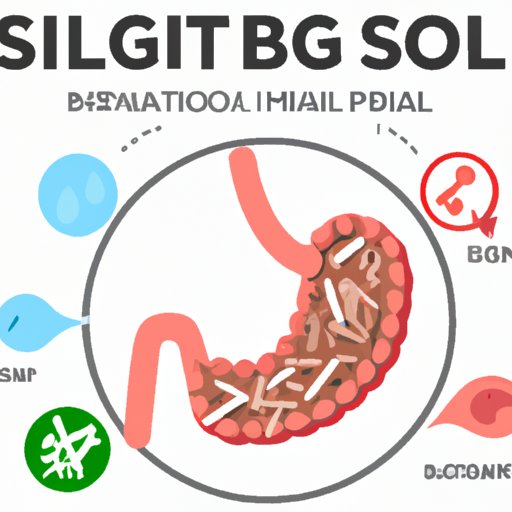
I. Introduction
SIBO (small intestinal bacterial overgrowth) is a common digestive health issue that affects many people. It occurs when there is an overgrowth of bacteria in the small intestine, leading to a variety of unpleasant symptoms. In this article, we will explore SIBO symptoms in detail and provide actionable tips for maintaining optimal gut health.
II. Understanding SIBO Symptoms: A Comprehensive Guide to Identifying the Condition
SIBO is a condition characterized by the overgrowth of bacteria in the small intestine. When bacteria accumulate in the small intestine, they can ferment food, producing gas and causing a variety of symptoms such as bloating, abdominal pain, diarrhea, and constipation.
It is essential to identify the symptoms of SIBO early because a delay in treatment can lead to more severe complications. Many different symptoms can indicate SIBO, such as digestive issues, food intolerances, and vitamin deficiencies.
The overlap of SIBO’s symptoms with other digestive conditions can make it difficult to recognize. That is why it is crucial to understand the various types of SIBO symptoms and how they may manifest.
III. How to Spot SIBO Symptoms Early: A Quick Guide to Optimal Gut Health
Caring for your gut health is one of the best ways to prevent SIBO. Eating a healthy diet, getting regular exercise, and managing stress are first steps to promoting gut health. Certain foods can also help prevent the development of SIBO, such as fermented foods, leafy greens, and lean proteins.
However, even with the best preventative measures, SIBO can develop, and it is essential to get an accurate diagnosis. Various tests can diagnose SIBO, including breath tests, lab tests, and imaging studies. Working with a healthcare professional is critical to ensure proper diagnosis and treatment.
IV. The Top 5 Warning Signs of SIBO You Shouldn’t Ignore
Here are five of the most common SIBO symptoms:
- Bloating and gas
- Abdominal pain and discomfort
- Diarrhea or constipation
- Nutritional deficiencies
- Food intolerances or sensitivities
If left untreated, SIBO can lead to more severe complications, including malabsorption, leaky gut, and autoimmune diseases.
V. Exploring the Complexities of SIBO Symptoms: A Breakdown of the Condition’s Effects
A fundamental understanding of SIBO’s symptoms is vital to recognize the condition’s precise mechanism. SIBO causes symptoms by fermenting food in the small intestine, producing excess gas and leading to bloating, abdominal pain, and diarrhea or constipation.
SIBO symptoms can also manifest through various dietary and lifestyle choices. Eating a diet high in processed foods, alcohol, and sugar can contribute to SIBO’s development.
VI. SIBO Symptoms Demystified: Simple Strategies for Diagnosis and Treatment
If SIBO is suspected, it is essential to seek medical attention to receive a proper diagnosis. Breath tests and lab testing are available to diagnose SIBO, and various treatment options are available, such as antibiotics, herbal supplements, and dietary changes.
Changing your lifestyle habits may also provide relief from SIBO symptoms, such as practicing stress-management techniques and avoiding processed foods, alcohol, and sugar.
VII. Gut Health 101: The Telltale Signs of SIBO and How to Alleviate Them
The key to maintaining optimal gut health is by making deliberate choices that support digestive health. Identifying symptoms early and seeking medical attention when necessary can prevent complications from SIBO. A combination of dietary changes, supplements, and lifestyle modifications provides practical and effective strategies for preventing and treating SIBO.
VIII. Conclusion
SIBO symptoms can be distressing, but taking action to prevent and treat them can make a significant difference in your digestive health. With the right approach, including dietary changes, supplements, and working with qualified healthcare professionals, people can manage SIBO symptoms effectively and maintain good gut health.




